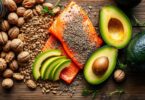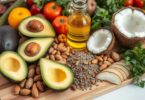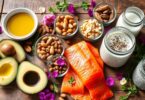Imagine waking up feeling full of energy, ready to take on the day. You make a delicious breakfast with avocado on whole-grain toast and a sprinkle of sea salt. This meal is not just tasty; it’s packed with healthy fats.
As you enjoy your breakfast, you realize that fat-rich foods are not bad. They are key to a balanced diet. Healthy fats help your body in many ways, like regulating hormones and absorbing nutrients. They are crucial for your health.
In a world that often focuses on low-fat diets, it’s time to change our views. We need to understand the good that dietary fats can do. Today, we’ll look at why fat-rich foods are important for a healthy life12.
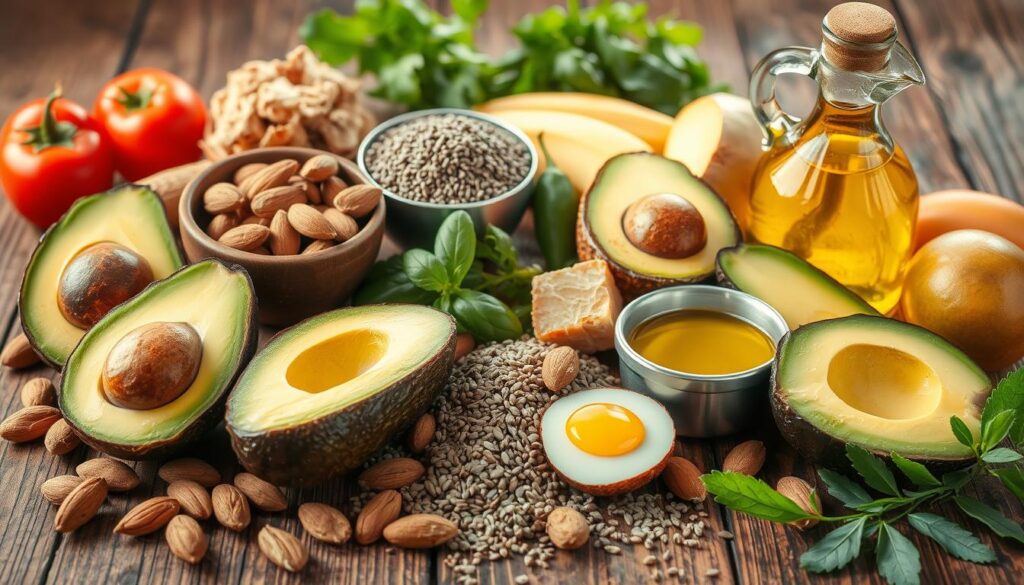
Key Takeaways
- Incorporating healthy fats into your diet can help improve overall health and wellness.
- Fat-rich foods are essential for hormone regulation and nutrient absorption.
- Myths about fats can lead to unhealthy dietary choices—embracing healthy fats is crucial.
- Monounsaturated and polyunsaturated fats are beneficial for heart health.
- Understanding the types of dietary fats enables better nutritional decisions.
The Importance of Healthy Fats in Your Diet
Adding important healthy fats to your meals is key for staying healthy. These fats help keep cells strong, make hormones, and help your body use vitamins. The American Heart Association says to keep saturated fats to 5% to 6% of your daily calories. That’s about 11 to 13 grams for someone eating 2,000 calories a day34.
Healthy fats, like monounsaturated and polyunsaturated fats, are good for your heart. But, eating too much of the wrong fats can harm your health. It’s more important to focus on the quality of fats you eat3. Foods like fatty fish and walnuts are full of omega-3 and omega-6 fatty acids. They help lower the risk of heart disease3.
Eating foods rich in unsaturated fats, like avocados and olive oil, is better for your heart. Research shows that trans fats are bad for your heart and have been banned in the U.S. by the FDA34.
Eating more fruits, veggies, whole grains, and healthy fats is good for your heart and overall health. Switching to unsaturated fats from saturated and trans fats can also help your blood cholesterol levels. This shows how important it is to choose the right fats in your diet4.
Understanding Fat-Rich Foods
Knowing about fats is key to making healthy dietary choices that boost our health. Foods high in fat give us energy and help us absorb nutrients. They also help keep our cholesterol levels healthy. Fats have 9 calories per gram, more than carbs and proteins which have 4 calories per gram56.
It’s vital to know the different types of fats to get the right mix. Saturated fats are in animal products like butter and cheese. The American Heart Association says we should limit these to 5% to 6% of our daily calories7. For a 2,000 calorie diet, that’s about 13 grams of saturated fat per day7.
Adding unsaturated fats, found in oils and nuts, can lower bad cholesterol. This is good for our heart5. Trans fats, found in processed foods, are bad because they raise bad cholesterol and lower good cholesterol6. Experts suggest replacing trans fats with healthier fats like those in olive oil and fatty fish56.
In short, knowing about fat-rich foods helps us make better choices. This way, we can enjoy tasty foods while staying healthy.
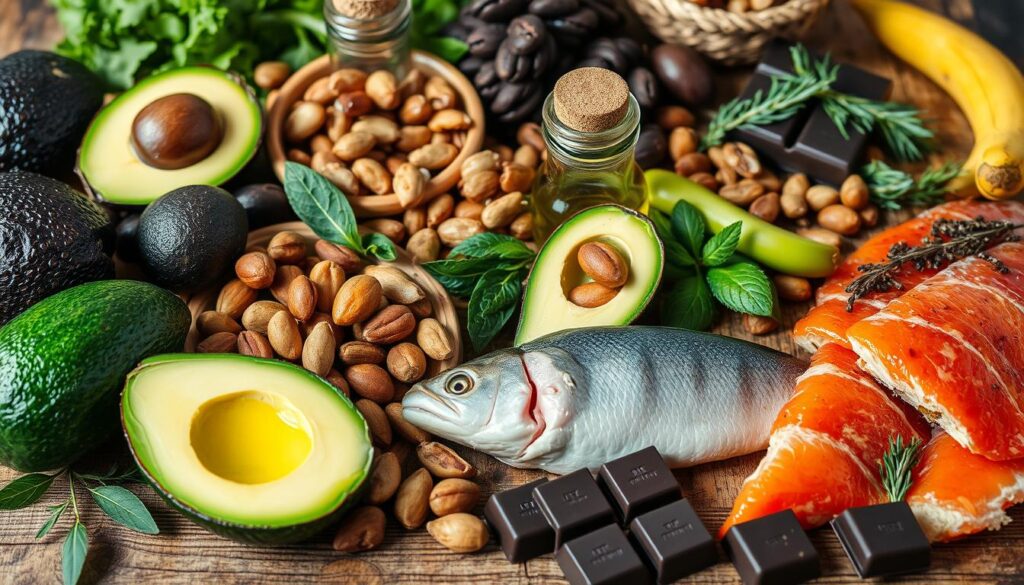
Essential Fatty Acids and Their Benefits
Essential fatty acids (EFAs) are key to our health. Omega-3s, found in fish and plants like flaxseeds, have many health benefits. They fight inflammation and help our hearts. The American Heart Association suggests eating 2 servings of fatty fish a week, about 3 ounces each8.
Research shows eating 8 ounces of fish weekly is good for omega-3s like DHA and EPA9. This can lower risks of heart disease and dementia. For example, mackerel has lots of EPA and DHA, boosting your intake10.
Omega-6s are also vital, coming from plant oils. They help our bodies use fats well. The recommended intake for alpha-linolenic acid (ALA) is 1,600 mg for men and 1,100 mg for women10.
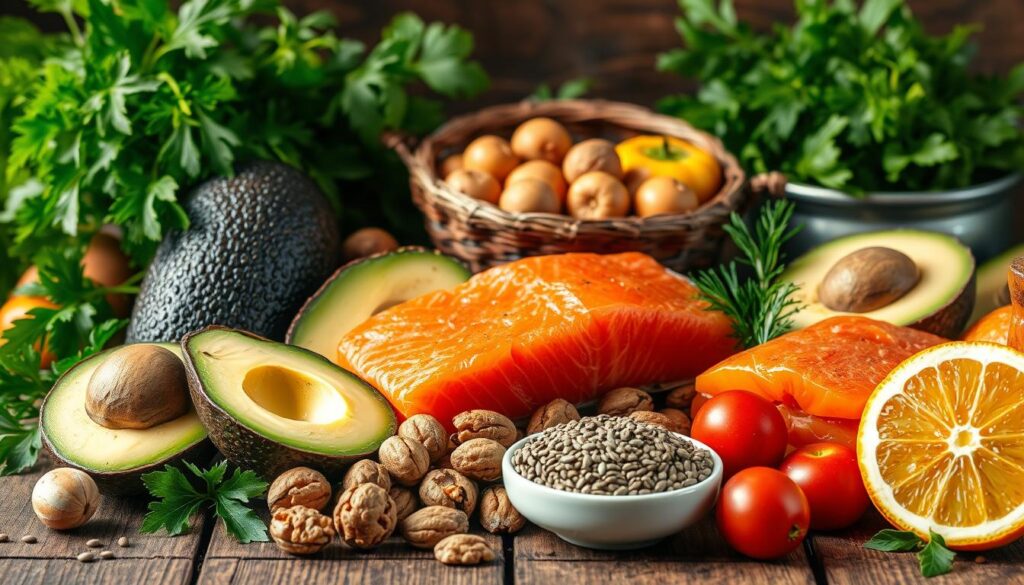
It’s good to eat foods rich in these acids every day. Nuts can help prevent heart disease, and avocados fight heart disease inflammation9. A diet full of these fats is good for your heart and brain, leading to a healthier life.
| Food Source | Omega-3 Content (mg per serving) | Contribution to Diet |
|---|---|---|
| Mackerel (3.5 oz) | 4,580 | High in EPA and DHA |
| Salmon (3.5 oz) | 2,150 | Supports heart health |
| Flaxseed (1 tbsp) | 2,350 (ALA) | Improves cholesterol levels |
| Chia seeds (1 oz) | 5,050 (ALA) | May lower high blood pressure |
| Walnuts (1 oz) | 2,570 (ALA) | Enhances heart protection |
Sources of Good Fats
Healthy fats are key to staying healthy. Knowing the different types of fats helps us make better food choices. Monounsaturated, polyunsaturated, and saturated fats each have their own health perks.
Monounsaturated Fats
Monounsaturated fats are super good for you. You can find them in olive oil, avocados, and nuts. Eating these fats can lower your cholesterol and heart disease risk11.
For example, a small serving of nuts is about 1 ounce. This can be 23 almonds or 14 walnut halves12. Avocados, full of monounsaturated fats, have about 160 calories for half a fruit. They make meals more filling12.
Polyunsaturated Fats
Polyunsaturated fats are essential because our bodies can’t make them. They’re great for the heart and reduce inflammation. You can find them in fatty fish like salmon and mackerel, which you should eat twice a week11.
Omega-3 fatty acids in flaxseed, chia seeds, and walnuts are good for your brain and mood12. For instance, 3 tablespoons of flaxseed have 12 grams of fat, with only 1 gram being saturated13.
Saturated Fats Explained
Saturated fats get a bad rap, but some are okay in small amounts. Foods like coconut and dark chocolate have saturated fats that might be good for you. Just remember, too much can raise your cholesterol.
For example, 80 grams of coconut has 27 grams of fat, with some of it being saturated13. Eating lean meats and full-fat dairy can also help you feel full and keep your diet balanced11.
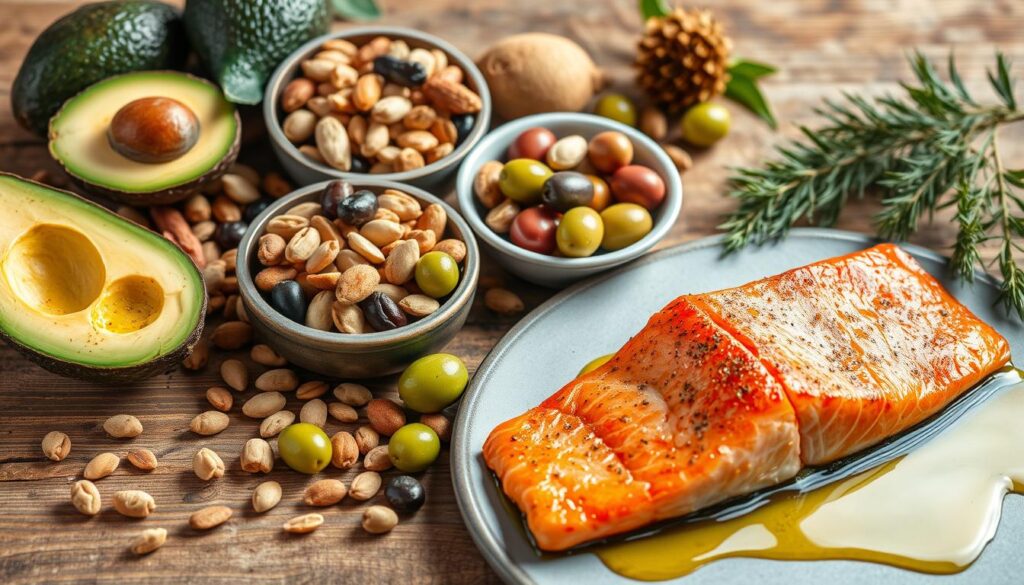
| Food Source | Type of Fat | Serving Size | Calories | Fat (g) |
|---|---|---|---|---|
| Olive Oil | Monounsaturated Fat | 1 tbsp | 124 | 14 |
| Salmon | Polyunsaturated Fat | 85g | 142 | 6 |
| Coconut | Saturated Fat | 80g | 283 | 27 |
| Walnuts | Polyunsaturated Fat | 30g | 185 | 18.5 |
| Avocado | Monounsaturated Fat | 1/2 medium | 160 | 15 |
Knowing where to find good fats helps you make healthier food choices. This can improve your overall health every day.
Top 12 Super Healthy High-Fat Foods
Adding super healthy high-fat foods to your diet can really boost it. This section focuses on three top foods: avocados, nuts, and fatty fish. They are full of healthy fats and offer many health benefits.
Avocado: The Superfood
Avocados are called superfoods because they’re packed with monounsaturated fats. A medium avocado has about 240 calories and 22 grams of fat. This can help lower bad cholesterol14.
These fruits make you feel full for longer. Eating half an avocado with lunch can make you less hungry for hours15. Avocados are great in smoothies or salads, adding creaminess and supporting heart health.
Nuts: Nutrient-Dense Powerhouses
Nuts like almonds, walnuts, and peanuts are full of healthy fats. For example, walnuts have about 185 calories and lots of omega-3 and omega-6 fatty acids14. Eating almonds can help you lose more weight than eating complex carbs15.
Adding nuts to your diet can make you feel full and give you important nutrients. This is good for your overall health.
Fatty Fish: Omega-3 Champions
Fatty fish like salmon, mackerel, and herring are great for omega-3s, which are good for your brain. A 3-ounce cooked salmon has about 200 calories and lots of omega-3s14. Wild Atlantic salmon also has 2.2 grams of omega-3s and 25.4 grams of protein per 100 grams16.
Eating fatty fish regularly can reduce inflammation and improve heart health.
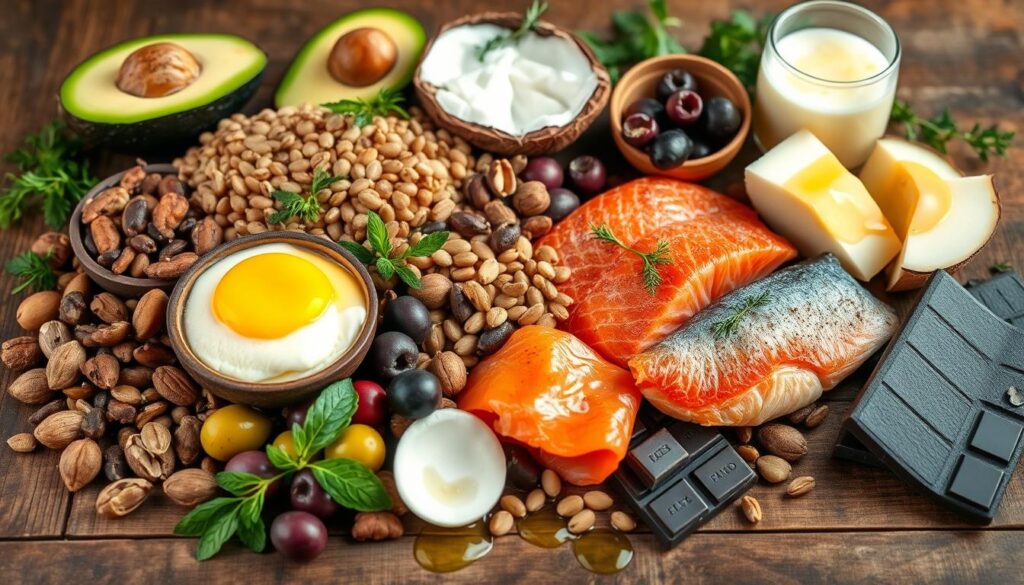
| Food | Calories | Healthy Fats (g) | Omega-3 Content (g) |
|---|---|---|---|
| Avocado | 240 | 22 | – |
| Walnuts | 185 | 18.5 | 2.5 (approx.) |
| Salmon | 200 | 13 | 2.2 |
Adding these foods to your diet can make your nutrition more balanced and improve your health161514.
Incorporating Fat-Rich Foods into Your Diet
Adding fat-rich foods to your meals can be fun and good for your health. It’s key to know how to cook them well to keep their nutrients. Experts say healthy fats should be 20–35% of what we eat, mainly from good fats17. Using olive oil for cooking makes food taste better and adds healthy fats.
Healthy Cooking Techniques
Choosing the right cooking methods is important to keep nutrients in food. Baking or steaming veggies in olive oil adds flavor and helps absorb vitamins A, D, E, and K18. These vitamins are important for our immune system and body functions. Eating foods rich in fat can also make you feel full, which can help you eat fewer calories17.
Adding Nuts and Seeds
Nuts and seeds are great for adding to meals and snacks. Adding walnuts or almonds to salads or smoothies not only tastes good but also gives you omega-3 fatty acids for brain health18. They make your food more nutritious and interesting. Try sprinkling them on yogurt or oatmeal for a tasty, healthy snack.
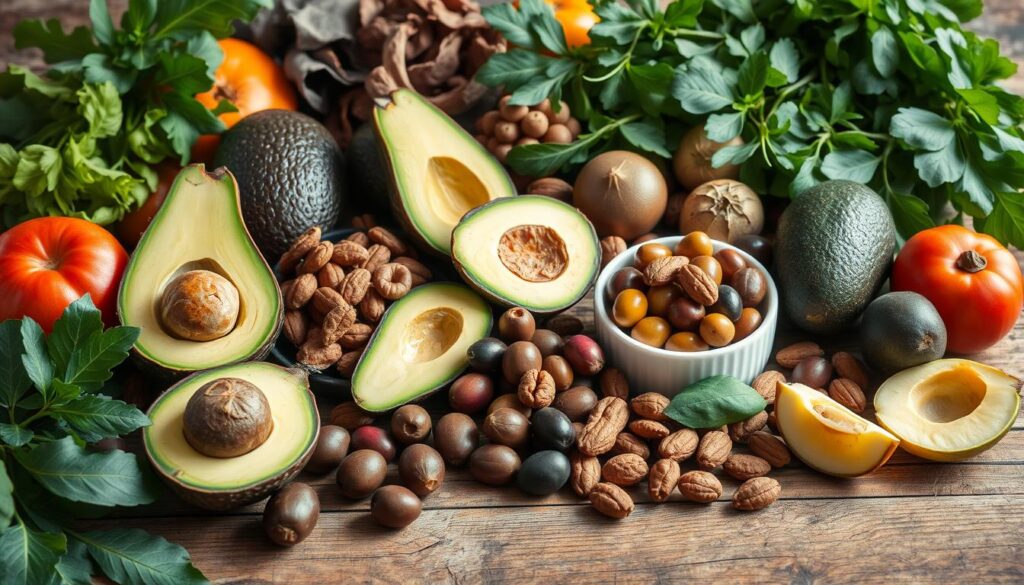
Why Embrace High-Fat Foods?
High-fat foods can greatly improve your health. They help with heart health, brain function, and nutrient absorption. The right fats, like monounsaturated and polyunsaturated, bring many health benefits.
Heart Health Benefits
Eating foods high in monounsaturated fats, like avocados and olive oil, can lower bad cholesterol. This is key for a healthy heart19. Fatty fish, such as salmon and mackerel, also help by reducing triglycerides and improving blood flow19. The Mediterranean diet, rich in healthy fats, is linked to better heart health20.
Brain Function Improvement
Healthy fats are vital for brain health. Omega-3 fatty acids, found in fish, nuts, and seeds, support brain function and mental well-being1920. They help with hormone production and may lower dementia risk19. Adding foods like eggs and nut butters to your diet boosts energy and heart health, benefiting your brain20.
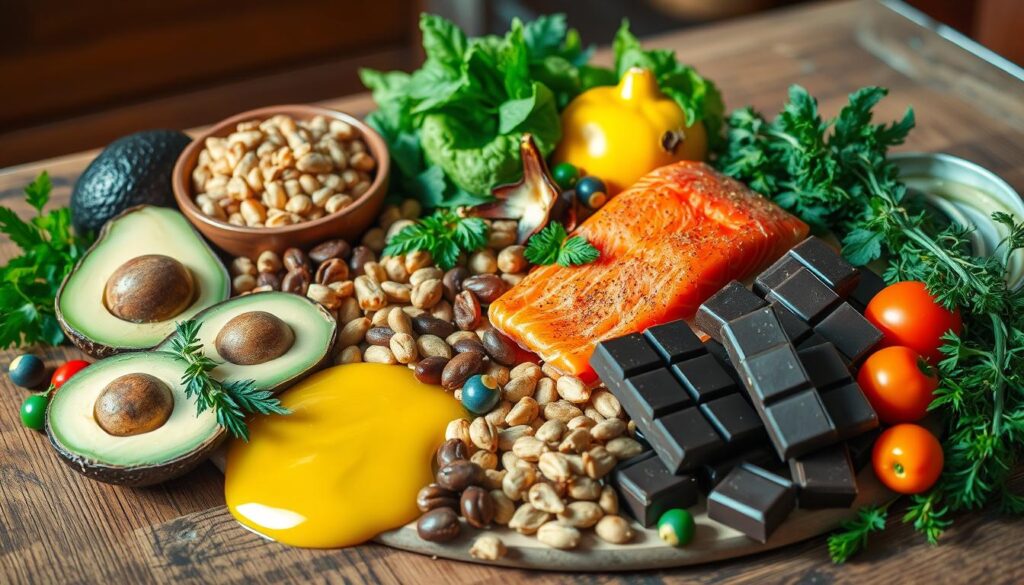
Common Myths About Fats
It’s important to know the truth about myths about fats to make smart food choices. Many people don’t understand the facts, especially about low-fat diet misconceptions. They think all fats are bad.
Low-Fat Diet Misconceptions
Some think a low-fat diet helps with weight loss. But skipping meals can actually make you gain weight because your metabolism slows down21. Also, avoiding all fats can lead to eating more processed foods with added sugars and unhealthy stuff22.
Challenging the Fat-Free Paradigm
The idea that all fats are bad is wrong. Healthy fats, like unsaturated fats, are good for us. They help us absorb vitamins and keep our cells healthy22. Foods like avocados, nuts, and peanut butter are full of healthy fats and are good for a balanced diet.
Instead of going for fat-free diets, focus on eating quality fats. This way, you get all the nutrients you need without missing out on important fats.
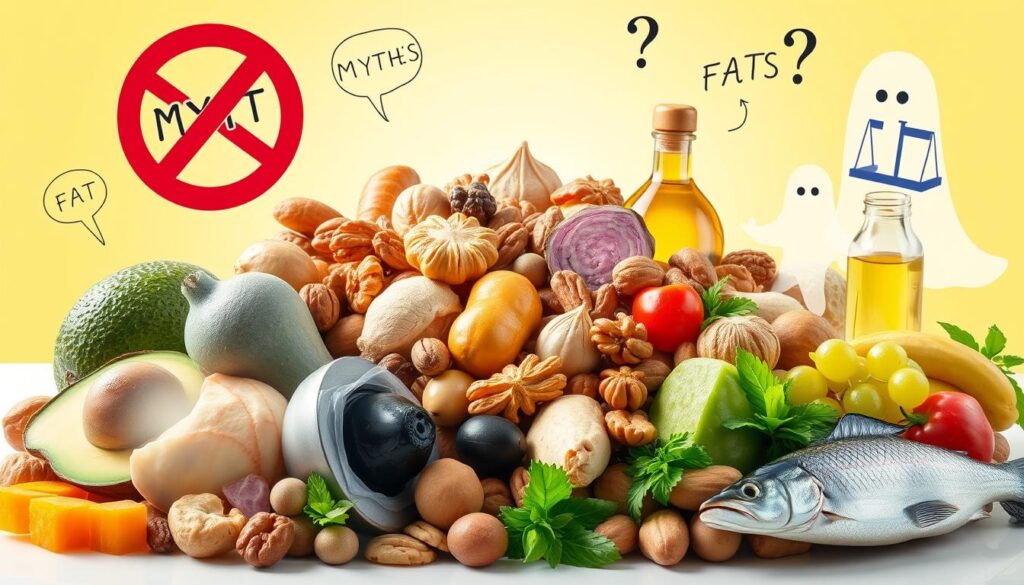
| Myth | Truth |
|---|---|
| All fats are bad for you. | Healthy fats are essential for body functions. |
| Low-fat equals healthy. | Many low-fat products have added sugars. |
| Skipping meals helps with weight loss. | It can slow metabolism and increase weight gain. |
| Fat-free diets are the best option. | Quality fats in moderation are key for health. |
Knowing the truth about fats helps us make better food choices. This leads to better health21.
Creating a Balanced Diet with Healthy Fats
Creating a balanced diet with healthy fats means knowing how to mix different sources. It’s important to balance proteins, carbs, and fats for good health. Healthy fats, like those in salmon, walnuts, and avocado, should make up 20% to 35% of your calories. Saturated fats should not exceed 10% of your daily intake23.
This way, you get a variety of nutrients. It helps keep your immune system strong. Foods rich in vitamins A, B, C, E, zinc, iron, and selenium are key24.
Eating a variety of foods helps you feel full and lowers disease risks. Foods high in fiber, like fruits and whole grains, are good for your gut and heart health24.
Being mindful of portion sizes is key to managing calories. Since fats have more calories than carbs or proteins, watch your servings23. Sticking to these choices improves your nutrition and health over time.
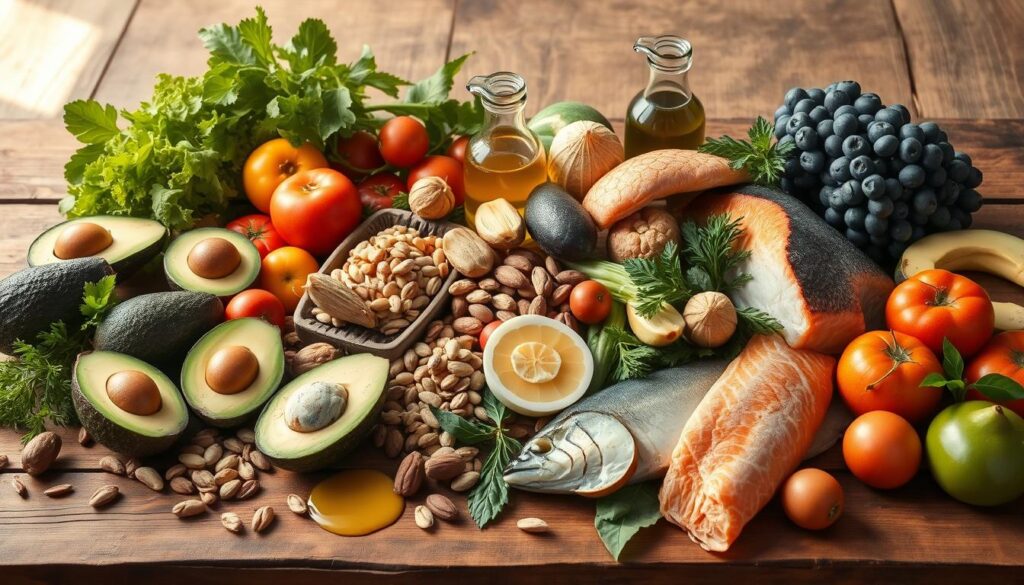
| Fat Type | Sources | Recommended Daily Intake |
|---|---|---|
| Saturated Fat | Animal products, tropical oils | Less than 10% of daily calories23 |
| Unsaturated Fat | Oily fish, nuts, seeds, avocados | 20% to 35% of daily calories23 |
| Omega-6 and Omega-3 | Flaxseeds, walnuts, fish | Ratio of 4:1 recommended25 |
Conclusion
Adding healthy fats to your diet is key for a balanced diet. It helps improve your overall health. By choosing fat-rich foods, you boost your nutrition and support hormone function, memory, and nutrient absorption2627.
The 2015-2020 Dietary Guidelines for Americans removed limits on total dietary fat. This is a great chance to focus on the quality of fats you eat, not just the amount25.
Healthy fats, like monounsaturated and polyunsaturated fats, are good for your heart. They help lower bad cholesterol and blood pressure, reducing heart disease risk2627. Eating foods rich in omega-3s, such as fatty fish and chia seeds, is also beneficial for your brain and health27.
In short, making smart choices about healthy fats is crucial for better nutrition. By focusing on these fats, you can make your meals healthier. This leads to long-term health and well-being25.
FAQ
What are healthy fats and why are they important?
Healthy fats are good for our bodies. They help with hormone balance, nutrient absorption, and heart health. They’re key to a balanced diet, helping lower bad cholesterol and boosting health.
What kinds of foods are high in healthy fats?
Foods high in healthy fats include avocados, nuts like almonds and walnuts, fatty fish like salmon, olive oil, and seeds like flaxseeds. These foods add nutrition and flavor to our meals.
How can I incorporate fat-rich foods into my diet?
Adding fat-rich foods is easy. Use olive oil for cooking, add avocado to salads, or snack on nuts and seeds. Include fatty fish in your meals. These steps boost healthy fats and flavor.
Are all fats bad for you?
No, not all fats are bad. Unhealthy fats from processed foods are harmful, but healthy fats are vital. They help prevent diseases and support health.
What are essential fatty acids and why do we need them?
Essential fatty acids, like omega-3 and omega-6, are needed but can’t be made by our bodies. They’re crucial for brain function, heart health, and reducing inflammation. They’re key to a healthy diet.
Can a high-fat diet be beneficial?
Yes, a diet rich in healthy fats offers many benefits. It improves heart health, cholesterol levels, brain function, and reduces disease risks. Focus on quality fats, not just reducing fat.
What are some common myths about dietary fats?
Many believe all fats are unhealthy or that low-fat diets are better. But, low-fat products often have added sugars and chemicals. Healthy fats are vital for a balanced diet.
How can I ensure I’m getting the right balance of fats in my diet?
For a balanced diet, follow macronutrient guidelines. Aim for a mix of proteins, carbs, and fats. Eat a variety of fats and watch portion sizes for overall health and nutrition.
Source Links
- 57 Best Fat Rich Foods, Fruits & Vegetables & Their Benefits
- The Importance of Eating Good Fats: Avocados, Fish Oil, and Other Healthy Fats | Food Poisoning News
- Is fat in your diet good or bad? Settling the debate – Mayo Clinic Press
- The Skinny on Fats
- Dietary fats explained: MedlinePlus Medical Encyclopedia
- Dietary Fats
- What Types of Fat Are in Foods?
- Healthy fats: 12 high fat foods to eat
- Include These High-Fat Foods in Your Diet
- 12 Foods That Are Very High in Omega-3
- 7 high-fat foods to include in your diet
- Healthy-Fat Foods
- High-fat foods that are *actually* good for you, according to experts
- Top 9 Healthy High-Fat Foods for Optimal Health – GeeksforGeeks
- 10 High-Fat Foods That Are Good for You
- 12 Of The Most Nutrient-Dense Foods You Can Eat
- 8 Benefits of Eating Healthy Fats
- All about fats
- 12 super healthy high fat foods
- Embrace Healthy Fats: Unlock the Essential Role of Fat in Hormone Production | Mars & Venus Counseling Center
- Nutritional Myths Debunked – Logan University
- The truth behind common nutrition myths
- Fat Grams: How Much Fat Should You Eat Per Day?
- Health benefits of eating well
- A dietitian’s take on how to eat healthy fats
- All You Wanted to Know About Good fats – Apollo Hospitals Blog
- Top Healthy Fats List: The Ultimate Guide

